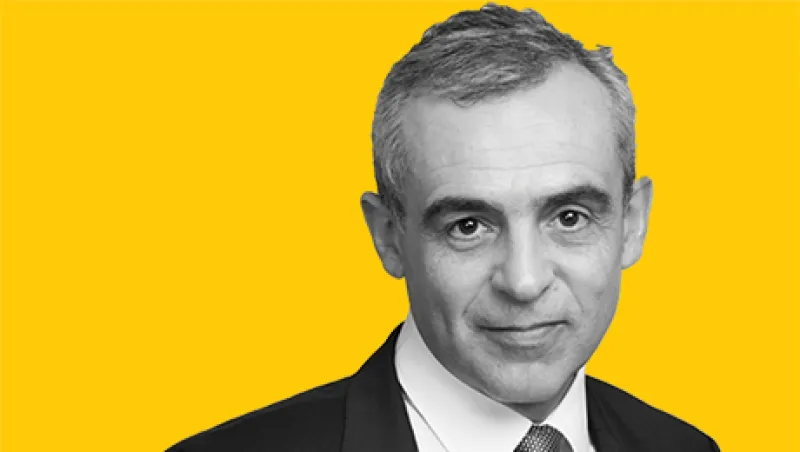An economist by training, Pascal Blanqué considers himself “very much a hybrid type of person,” who enjoys doing financial market research as much as he likes putting his theories into practice. He has had plenty of opportunity to do both as CIO of Amundi, Europe’s largest pure-play asset manager, since the firm’s creation 11 years ago via the merger of the fund management arms of French banks Crédit Agricole and Société Générale.
In his 2014 book, Essays in Positive Investment Management, Blanqué slays what he calls the sacred cows of Modern Portfolio Theory and their adoption by investors, among them a failure to address the chances that liquidity can dry up and a focus on historical volatility, which is, in his words, “one of the most procyclically biased measures of risk.” Blanqué also believes investors still handicap themselves by focusing too much on annual returns. “It’s difficult to embrace the long-term investing challenge without getting rid of this,” he says. “We should stick to wealth creation at an investment horizon.”
Creating wealth isn’t easy in today’s environment of zero and negative interest rates, and Blanqué sees little prospect of that changing any time soon. He believes the Federal Reserve is more likely to ease in the wake of its December rate hike, which he calls a one-off, counterproductive move, and that the European Central Bank will maintain quantitative easing far into the future. “We don’t know who is driving whom — the market or the Fed,” he says. “I’m not sure there is a way back from these policies.”
In his view, the only solution for investors is to seek maximum diversification, beginning with fixed-income alternatives — everything from emerging-markets debt to private credit to infrastructure. Blanqué, 51, has been focusing on the intersection of economics, policymaking and markets since obtaining a Ph.D. in finance from Université Paris-Dauphine. He dreamed of becoming a professor, but his first job, on the buy side at Paribas in 1991, set him on a different path. He went to London as an asset allocation strategist, rose to deputy chief economist, then jumped to Crédit Agricole as chief economist before taking his post at €985 billion ($1.1 trillion) Amundi. Along the way he has found time to write more than a dozen books on markets and economics.
Sustainability is an increasingly important part of diversification and long-term investing, Blanqué says. Last year Amundi launched two index funds and one exchange-traded fund that track MSCI’s Global Low Carbon Leaders indexes, which the firm helped design; it’s also working with French civil-service pension fund ERAFP to decarbonize a €700 million equity portfolio. The executive has also ramped up Amundi’s ETF offerings and smart-beta index tilts. The firm sees ETFs as vital to its expansion goals in Asia, where it currently manages some €120 billion, equal to its Europe ex-France assets. Last month Amundi listed its first ETF in Hong Kong.
ETFs aren’t a panacea, but at a time of subdued prospects — Blanqué sees average returns of 3 to 4 percent a year over the next five years — efficient execution is paramount. “In a world of low interest rates, every basis point matters critically,” he says.
Return to “Europe’s Money Masters of 2016.”
< 2016 European Money MastersClick below to view profiles.
| Investor Lifetime AchievementRoger GrayUniversities Superannuation SchemeGermanyStefan HentschelEvonik IndustriesU.K. CorporateTony BroccardoBarclays UK Retirement FundCentral and Eastern EuropeKatrin RaheSwedbank Investment Funds |
| Manager Lifetime AchievementPascal BlanquéAmundiNetherlandsMark BurbachBlue Sky GroupSmall CountriesPaul DroopBank of IrelandFranceSalwa Boussoukaya-NasrFonds de Réserve pour les Retraites |
| SwitzerlandAdrian RyserMigros-PensionskasseU.K. PublicMark LyonEast Riding Pension FundScandinaviaHenrik Olejasz LarsenSampension |






